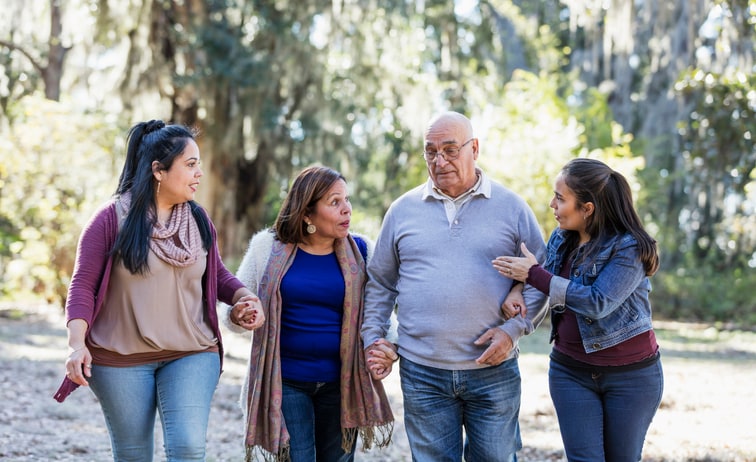For many families, there comes a point when it’s time to talk seriously about transitioning a senior loved one into long-term, residential care such as assisted living or a nursing home. Today, more than 800,000 people reside in assisted living facilities, and about 7 out of 10 people will require some form of assisted living care in their lifetime, according to a report by Consumer Affairs. But facility care can still be tough to talk about or prepare for. When it’s your loved one who needs to make this transition, figuring out when and how to have the conversation can cause a lot of stress.
“Guilt and grief may be felt on both sides,” says Kristin Roelofson, a therapist and licensed clinical social worker who practices at Thriveworks in Pittsburgh, Pennsylvania. “Family members may feel guilt insofar as believing that they ‘ought to’ be able to care for their loved ones. The loved one may feel guilt in thinking they have ‘burdened’ family with their care and grief over leaving behind a lifestyle to which they have become accustomed.”
According to data from the Care.com 2021 Senior Care Outlook Survey, 53% of adult children anticipate that talking about senior care options with their loved ones will be difficult. But, as difficult as it may be, these conversations are vital to seniors’ well-being and need to be had. If you’re considering care options for your loved one and preparing to discuss a move into facility care, here’s what experts say you can do to get ready for the talk and to support your loved one as you move through this change together.
“Guilt and grief may be felt on both sides. Family members may feel guilt insofar as believing that they ‘ought to’ be able to care for their loved ones. The loved one may feel guilt in thinking they have ‘burdened’ family with their care and grief over leaving behind a lifestyle to which they have become accustomed.”
— KRISTIN ROELOFSON, LICENSED CLINICAL SOCIAL WORKER WITH THRIVEWORKS
What to do before discussing the transition to facility care
“Family members who must prepare a loved one to transition into a care facility may feel ‘back-and-forth’ feelings between guilt and grief,” Roelofson says. “Acknowledging that those feelings are a normal part of this life-changing event and that they may ebb and flow is essential.”
As you prepare to have this conversation with your loved one, Roelofson recommends giving yourself space to process your feelings, including working with a mental health professional, if needed. She also advises focusing on the reasons you’re making this change and being prepared to discuss them with your loved one. In particular, she says, consider the following:
- Why this is the best course of action for yourself and your loved one.
- How this option meets your loved one’s need for safety and security.
- The importance of facility care to your loved one’s health.
- The quality of care your loved one needs and will receive.
Lastly, Roelofson says to remember that finding proper care and support for your loved one is, in itself, an act of care.
“There is nothing wrong with acknowledging that the care required for the loved one is more than family members can do on their own,” she says. “Family members should be encouraged to recognize their new relationship with their loved one; they are still providing love and care, and can now serve as a ‘voice’ for their loved one’s care while professionals are providing around-the-clock support.”
Tips for talking about facility care with your loved one
Your loved one’s move into a care facility may be something you’ve discussed and prepared for ahead of time or it may be the result of a sudden life change. In either situation, your role in talking to them about this change is to help them process their feelings, feel prepared and informed and ease into the transition with as much support as possible. Here’s how the experts say to do that.
1. Normalize their grief
“There is a lot of loss when people move into assisted living and care facilities,” says Kim Shea, a retirement coach and the president of Geriatric Counseling Services, Inc. in Carlsbad, California. “There is a loss of independence, paring down of possessions and leaving behind friends, possibly pets and a home. The grief and fear that come with a transition need to be respected and acknowledged.”
As you discuss the upcoming changes with your loved one, Roelofson says to allow them space to share all of their emotions. “Use active listening,” she advises. “Allow them to share their feelings of fear, anticipated loneliness and isolation and possibly sadness over moving away from family. Demonstrate understanding of their feelings and let them know that they are entitled to feel those feelings in the moment.”
2. Offer reassurance
Some seniors may fear they’re being abandoned or assume they’ve placed too heavy a burden of care on their family members.
“Assure your loved ones that you will be there for them as they adapt to this new life and that you will navigate this transition and any resulting feelings together,” Roelofson says. “Refrain from stating or implying that the person needs more help or care than you can muster. You want to prevent them from feeling guilty or burdensome for their present situation, or thinking that their independence has completely disappeared.”
“Always keep in mind that the decision to move to a care facility will fall along a spectrum. They may not accept it right away. Allow them to come to accept this change in their own way.”
— DR. PUJA UPPAL, A BOARD-CERTIFIED FAMILY MEDICINE PHYSICIAN and founder and CMO of think healthy
3. Focus on what is being gained
It’s important for your loved one to know that transitioning into facility care isn’t a “failure” on their part, and it will actually result in a better quality of life. “Instead of focusing on the functional deficits, focus on the independence they will acquire due to the move,” says Dr. Puja Uppal, a board-certified family medicine physician in Michigan, and the founder and Chief Medical Officer of the medical literary resource Think Healthy.
She recommends making a list of the emotional, physical and medical benefits seniors can experience due to this transition. This may include:
- Increased mobility.
- Fewer daily chores, such as meal prep and cleaning.
- Daily medicine reminders.
- New opportunities to socialize.
- Ease of access to quality care.
- Renewed focus on hobbies and interests.
- Mental health support.
Though there are many positives to this transition, Uppal warns not to force positivity if your loved one needs space to process their feelings. “Always keep in mind that the decision to move to a care facility will fall along a spectrum,” she says. “They may not accept it right away. Allow them to come to accept this change in their own way.”
5. Talk about the kind of care they want and need
If your loved one is able to work with you to find the right care facility, talk about what they want out of their care and learn as much as possible about the different care facilities in your area. When evaluating care facilities, some important questions experts say to consider include:
- Is there a psychologist or counselor available on a regular basis?
- Does your loved one need additional insurance or financial support?
- Do they want a roommate or is a private room available?
- What resources does the facility have to assist newcomers?
- What does a typical day at the facility look like?
- Do they specialize in the type of care your loved one needs?
If you need help with long term care planning, estate planning and guardianship, Uppal recommends seeking an elder care lawyer to ensure your loved one’s rights are protected. For information about community resources and care options, she recommends contacting your local chapter of Area Agency on Aging or the National Council on Aging.
6. Discuss a plan to help them transition
“Work out a game plan with your loved one for visits to the care facility, so they can rest assured that family members have not abandoned them and are joining them on this journey,” Roelofson says. “Whenever possible family members should also visit the facility with their loved one before the move to have a clearer picture of what the facility will offer your loved one.”
Shea says some other helpful things to do in preparation for the move include:
- Recording images of and storing items too big or valuable to take with them.
- Making photo albums for the loved one to look at if they are homesick.
- Planning regular pet visits if they can’t take their pet along — or finding out if they can acquire emotional support animal paperwork.
- Getting to know staff and care providers, if possible.
7. Have the right support on call
Uppal says learning of the transition to a care facility can trigger anxiety, insomnia or depression in some seniors. If this is the case for your loved one, a therapist or counselor may be able to help them work through their emotions. Additionally, Uppal recommends working together with a case manager. “The case manager, who’s usually a nurse, works closely with your loved one’s doctor and they often are attuned to all the community resources that are available,” she explains. “A case manager will help with the logistics of keeping your loved one safe in their current home until a more permanent transition is made.”
How to ease your loved one’s transition
Once your loved one has made the move into a care facility, your biggest jobs are visiting regularly, taking on an active role as their care advocate and working closely with their support team to create the best experience possible, says Shea.
“Allow three months or so for the adjustment to make headway,” she advises. “Go to activities with them. Learn to love bingo and movie nights. Make friends with their friends, other families and the staff. Don’t drop the loved one off and stay away until the next holiday. They need reassurance that they still matter to their family.”
You can support staff by getting to know them, talking diplomatically about your loved one’s care and even bringing small gifts, like a bag of fresh oranges or a platter of vegetables and dip, notes Shea. “Many people really care about older people and that is why they’ve chosen the job. Regard them as members of your team,” she adds.
While transitioning into a care facility is never easy, doing everything you can to support your loved one and their caregivers will create a more positive experience all around, notes Shea. “There is fear of the unknown,” she concludes. “But as people become settled in their new living arrangement, they often find that the people they meet there become a second family to them, and normalcy sets in.”




